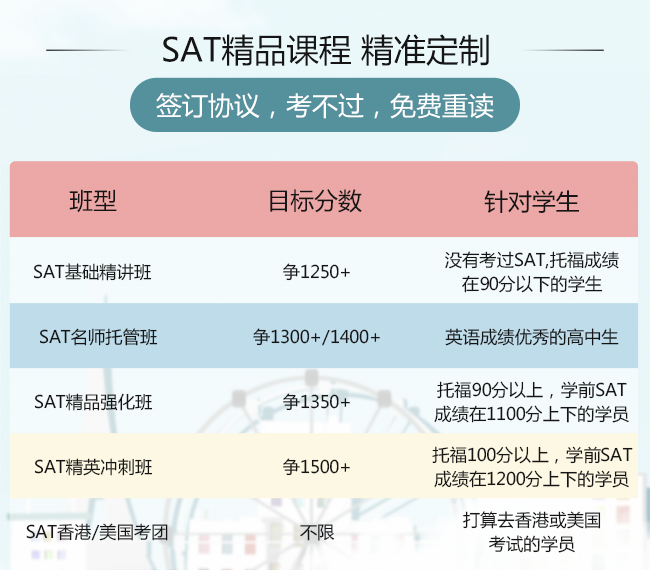2018年10月6日北美SAT阅读真题回忆—篇
2018年10月6日北美SAT真题回忆-阅读篇考试难度分析:
本次北美SAT考试的阅读部分整体难度中等偏上,文学难度相对不高,没有考察文章主旨和任何的词汇题,相对5月北美的Sister Carrie明显语言难度一般,主要的难度来自于第三篇有关神经纤维对于刺激的感知,属于生命科学题材中难度较高的类型,文章结构虽然比较清晰,但实验的过程和某些细节由于生词较多可能会对考生的理解造成一定难度。而历史双篇对比出现在第四篇,涉及的话题--imperialism(帝国主义)可能相对一般考生比较陌生,两篇文章对于美国在20世纪初推行帝国主义政策持相反观点,P1选自Albert Beveridge的演讲:The March of the Flag, 其中出现了大量的appeal to emotion和排比的经典考法,P2选自William Bryan的(The Paralyzing Influence of) Imperialism,同样使用了一种经典的写作手法来支持Philippine Islands的自治。

上海SAT培训哪家好 ?上新航道不纠结,团队授课,量身定制学习方案,助教全程跟踪辅导!
2018年10月6日北美SAT真题回忆-阅读篇:
P1:Fiction:The Cailiffs of Baghdad, Georgia
从一个Miss Grace Spivey的学生的视角讲述Miss Grace Spivey作为一个well-traveled的女性在1938年初次来到Georgia的一个城镇Threestep时的场景,首段讲到了Spivey对于月份的评论irritate那些热情迎接这位新教师到来的人群,后文讲到Spivey本人的教育经历,以及和Ralphord的互动,高潮部分在于她与Professor Dewey的偶遇对于她教育理念的影响以及这种理念在课堂中的应用。
原文:
An excerpt from The Cailiffs of Baghdad, Georgia
FROM Chapter 1Miss Spivey, For and Against
Miss Grace Spivey arrived in Threestep, Georgia, in August of 1938. She stepped off the train wearing a pair of thick-soled boots suitable for hiking, a navy blue dress, and a little white tam that rode the waves of her red hair at a gravity-defying angle. August was a hellish month to step off the train in Georgia, although it was nothing, she said, compared to the 119 degrees that greeted her when she got off the boat one time in the place she called Al-Basrah. I believe her remark irritated some of the people gathered to welcome her on the burnt grass alongside the tracks. When folks are sweating through their shorts, they don't like to hear that this is nothing compared to someplace else. Irritated or not, the majority of those present were inclined to see the arrival of the new schoolteacher in a positive light. Hard times were still upon us in 1938, but, like my momma said, “We weren’t no poorer than we’d ever been,” and the citizens of Threestep were in the mood for a little excitement.
Miss Spivey looked like just the right person to give it to them. She was, by almost anyone's standards, a woman of the world. She’d gone to boarding schools since she was six years old, she’d studied French in Paris and drama in London, and during what she called a “fruitful intermission” in her formal education, she had traveled extensively in the Near East and Africa with a friend of her grandmother’s, one Janet Miller, who was a medical doctor from Nashville, Tennessee. After her travels with Dr. Miller, Miss Spivey continued her education by attending Barnard College in New York City. She told us that at school the first day. When my little brother Ralphord asked what did she study at Barnyard College, Miss Spivey explained that Barnard, which she wrote on the blackboard, was the sister school of Columbia University, of which, she expected, we all had heard.
It was there, she told us, in the midst of trying to find her true mission in life, that she wandered one afternoon into a lecture by the famous John Dewey, who was talking about his famous book, Democracy and Education. Professor Dewey was in his seventies by then, Miss Spivey said, but he still liked to chat with students after a lecture—especially female students, she added—sometimes over coffee, and see in their eyes the fire his words could kindle. It was after this lecture and subsequent coffee that Miss Spivey had marched to the Teacher’s College and signed up, all aflame. Two years later, she told a cheery blue-suited woman from the WPA that she wanted to bring democracy and education to the poorest, darkest, most remote and forgotten corner of America.
They sent her to Threestep, Georgia.
Miss Spivey paused there for questions, avoiding my brother Ralphord’s eye.
What we really wanted to know about—all 26 of us across seven grade levels in the one room—was the pearly white button hanging on a string in front of the blackboard behind the teacher’s desk up front. That button on a string was something new. When Mavis Davis (our only bona fide seventh grader at age thirteen) asked what it was for, Miss Spivey gave the string a tug, and to our astonishment, the whole world--or at least a wrinkled map of it--unfolded before our eyes. Miss Spivey’s predecessor, Miss Chandler, had never once made use of that map, which was older than our fathers, and until that moment, not a one of us knew it was there.
Miss Spivey showed us on the map how she and Dr. Janet Miller had sailed across the Atlantic Ocean and past the Rock of Gibraltar into the Mediterranean Sea. Using the end of a ruler, she gently tapped such places as Morocco and Tunis and Algiers to mark their route along the top of Africa. In Egypt, she said, they stopped long enough to climb a pyramid, a sketch of which she drew for us on the board, next to the map. "I wish I could convey to you children its true size and grandeur," she said. From there, they went on through the Gulf of Suez and down around Arabia and right up the Persian Gulf, which Miss Spivey said was the most beautiful body of water in the world. They spent twenty hours on the train to Baghdad after that, swathed in veils against the sand that crept in every crack and crevice. I pictured them with scarves pulled across their faces, like a pair of lady bandits.
“And can you guess what we saw from the train?” Miss Spivey asked. We could not. “Camels!” she said. “We saw a whole caravan of camels.” She looked around the room, waiting for us to be amazed and delighted at the thought.
We all hung there for a minute, thinking hard--you could see the anticipation on Miss Spivey’s face fading as the seconds passed--until Mavis Davis spoke up.
“She means like the three kings rode to Bethlehem,” Mavis said, and she folded her hands smugly on her 7th-grade desk in the back of the room.
Miss Spivey made a mistake right then. Instead of beaming upon Mavis the kind of congratulatory smile that old Miss Chandler would have bestowed on her for having enlightened the rest of us, Miss Spivey simply said, “That’s right.” I think maybe she was so flabbergasted that we didn’t all of us know what a camel was that she wasn’t sure what to do next, and what she did do only made Mavis feel all the more under-appreciated. Miss Spivey turned from the map--actually, she whirled around with all the flowery layers of a dress the Superintendent of Schools would later call “inappropriate” fluttering around her legs--and she pointed with her piece of chalk straight at me. My heart was making such a ruckus in my ears as I stood up that I hardly heard her ask my name. I thought she already knew it, based on the name cards she’d stuck on our desks.
新航道上海sat培训 开设有各种SAT培训班 ,小班教学,团队一对一指导,助教全程跟踪辅导,直达高分不在是梦。












